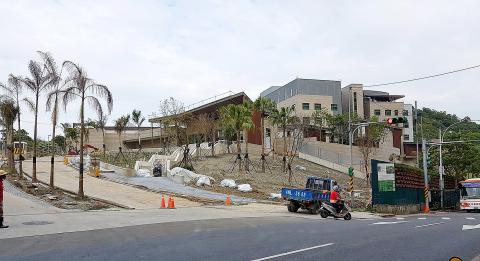Construction of the new American Institute in Taiwan (AIT) compound in Taipei’s Neihu District (內湖) took “an awful long time,” but the finished site, in which feng shui had a role, looks “attractive and functional,” former AIT chairman Raymond Burghardt said on Wednesday.
Burghardt, who served as AIT director from 1999 to 2001 and chairman from 2006 to 2016, said he was delighted to see work on the complex nearing completion, although it took nearly a decade to build, and it looks beautiful compared with US embassies he has visited.
The AIT took out a 99-year lease on the 6.5 hectare hillside site with the Taipei City government in 2004 and construction was originally scheduled to be completed in 2015.

Photo: Chang Chia-ming, Taipei Times
A dedication ceremony was held on Tuesday, but staff are not scheduled to move into the new complex until sometime in September or afterwards.
Burghardt said he was directly involved in choosing the site, which he liked because he believed it has good feng shui, as the site has a mountain at its back and river in front.
He said he did not consult a feng shui master, but used his own knowledge of basic feng shui concepts as well as advice from Taiwanese friends.
However, after construction began, engineers found some problems, he said.
The mountainside location, and Taiwan’s frequent rains, meant that a tremendous amount of time and money was needed to build retaining walls and other facilities so that water could be drained from the site.
“I felt a little guilty about that,” he said.
However, the long wait was more than worth it, Burghardt said.
President Tsai Ing-wen (蔡英文) and former president Ma Ying-jeou (馬英九) both said that the new building has a very “American flavor,” he said.
While he did not know exactly what they meant, he believed it is because the compound is airy and has a lot of natural light, with a perfect combination of natural wood and stone, he said.
Asked which part of the building he likes best, he said the complex has many informal meeting places that can also be used for receptions, something that AIT’s current location on Xinyi Road does not have.
These spaces can be used to hold receptions or cocktail parties without the need to rent hotel facilities, which is a great asset, he said.
Asked to comment on the cross-strait impasse, Burghardt again called on both side to use “creativity, flexibility and patience,” phrases he used before he left stepped down as AIT chairman in the summer of 2016.
However, the lack of mutual trust between the two sides makes it very difficult to resume official talks, he said.
Tsai has shown some creativity and patience, but the problem lies in the fact that “Beijing has not met her halfway,” he said.
Asked for some concrete suggestions, Burghardt said Chinese academics and officials from China’s Taiwan Affairs Office have suggested that the Democratic Progressive Party (DPP) could freeze the independence clause in its party constitution to make party-to-party talks possible.
However, Tsai was not likely to do so, given the year-end elections, he said.
The DPP could use private channels to engage in quiet communications in an attempt to rebuild mutual trust, he said.

Chinese Nationalist Party (KMT) Chairman Eric Chu (朱立倫), spokeswoman Yang Chih-yu (楊智伃) and Legislator Hsieh Lung-chieh (謝龍介) would be summoned by police for questioning for leading an illegal assembly on Thursday evening last week, Minister of the Interior Liu Shyh-fang (劉世芳) said today. The three KMT officials led an assembly outside the Taipei City Prosecutors’ Office, a restricted area where public assembly is not allowed, protesting the questioning of several KMT staff and searches of KMT headquarters and offices in a recall petition forgery case. Chu, Yang and Hsieh are all suspected of contravening the Assembly and Parade Act (集會遊行法) by holding

PRAISE: Japanese visitor Takashi Kubota said the Taiwanese temple architecture images showcased in the AI Art Gallery were the most impressive displays he saw Taiwan does not have an official pavilion at the World Expo in Osaka, Japan, because of its diplomatic predicament, but the government-backed Tech World pavilion is drawing interest with its unique recreations of works by Taiwanese artists. The pavilion features an artificial intelligence (AI)-based art gallery showcasing works of famous Taiwanese artists from the Japanese colonial period using innovative technologies. Among its main simulated displays are Eastern gouache paintings by Chen Chin (陳進), Lin Yu-shan (林玉山) and Kuo Hsueh-hu (郭雪湖), who were the three young Taiwanese painters selected for the East Asian Painting exhibition in 1927. Gouache is a water-based

Taiwan would welcome the return of Honduras as a diplomatic ally if its next president decides to make such a move, Minister of Foreign Affairs Lin Chia-lung (林佳龍) said yesterday. “Of course, we would welcome Honduras if they want to restore diplomatic ties with Taiwan after their elections,” Lin said at a meeting of the legislature’s Foreign Affairs and National Defense Committee, when asked to comment on statements made by two of the three Honduran presidential candidates during the presidential campaign in the Central American country. Taiwan is paying close attention to the region as a whole in the wake of a

OFF-TARGET: More than 30,000 participants were expected to take part in the Games next month, but only 6,550 foreign and 19,400 Taiwanese athletes have registered Taipei city councilors yesterday blasted the organizers of next month’s World Masters Games over sudden timetable and venue changes, which they said have caused thousands of participants to back out of the international sporting event, among other organizational issues. They also cited visa delays and political interference by China as reasons many foreign athletes are requesting refunds for the event, to be held from May 17 to 30. Jointly organized by the Taipei and New Taipei City governments, the games have been rocked by numerous controversies since preparations began in 2020. Taipei City Councilor Lin Yen-feng (林延鳳) said yesterday that new measures by